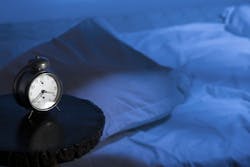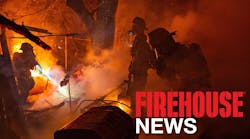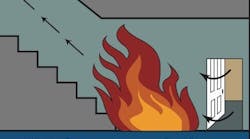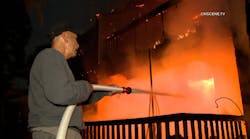How many of us have endured sleep deprivation? If we’re honest, that number may be close to 100 percent because we have all had those nights where the calls came in one after another. Follow that with a day of off-duty events, and it’s easy to see how we can’t get caught up on rest.
As a retired career firefighter, all I can say is thank God for “rumble strips” on the side of the highway, as there were numerous times when I made my way home after a sleepless shift and drifted off the road, only to be rattled back awake by those strips. Toward the end of my career, I found it difficult to physically and mentally handle the effects of sleep deprivation. In fact, on-duty sleep deprivation was perhaps the biggest reason I opted for retirement. Because of my experience, I began to research the effects of sleep deprivation.
Most of us get enough sleep at home in our own beds, but as time goes on, fewer and fewer first responders are getting the restorative sleep that is needed to sustain us. The problem is that emergency services personnel are becoming more sleep-deprived because of getting less sleep while on duty for a variety of reasons, such as ever-increasing call volume, decreased staffing, and automatic- and mutual-aid call volume. These current conditions mean that EMS personnel and firefighters are frequently running on empty in terms of quality and quantity of sleep.
This may seem like business as usual, as most in this field know that sleepless nights will be in their future—but how many sleepless nights, and, at what cost? Additionally, as responders age, what associated complications may appear as a result of sleep deprivation? To this end, this article will examine the potential complications where both short-term and long-term sleep deprivation can manifest in regards to health and safety issues. We’ll also discuss some short-term solutions and even some successful long-term strategies to better manage sleep deprivation.
Sleep basics, cycles and hypnograms
By definition, sleep is “a naturally occurring, reversible, periodic and recurring state in which consciousness and muscular activity is temporarily suspended or diminished, and outside stimuli is reduced.”1 Most people need a certain amount of sleep to function adequately, and the quantity varies substantially. The range usually falls within 4 to 9 hours with 7 or 8 hours of sleep per day being the norm. Quality of sleep is another consideration, as uninterrupted sleep is important in order for our brains to conduct its restorative functions.
Research has found that most people undergo four of five sleep cycles when they sleep. Each cycle contains varying amounts of rapid eye movement (REM) and non-rapid eye movement stages. After falling asleep, the brain will enter the first cycle that is approximately 90 minutes in length, and it includes three stages of non-REM sleep, with the third stage being the deep sleep, or slow-wave stage.
After a sleep cycle, instead of waking up, the brain may enter a period of REM sleep, where dreams occur and the brain undergoes restorative functions. This cycle repeats another three or four times provided the sleep period is not interrupted. As the total sleep period unfolds, stage 3 sleep decreases, and REM sleep increases each cycle.
Hypnograms can measure the sleep cycles and the associated time that the brain is in each stage through brain wave monitoring. Knowledge of these sleep cycles provide the understanding that if a cycle is broken by being awakened, such as an emergency tone during the night, the sleep needed by the responder will not be as restorative as it could be. Numerous successive nights of enduring being awakened during sleep can lead to physical and mental exhaustion.
Sleep deprivation and health
According to sleep researcher Susan L. Koen, PhD, president of Round-the-Clock-Systems, sleep deprivation is defined as, “Insufficient deep sleep or restorative sleep for the brain, causes cognitive or brain fatigue that can result in slowed reaction time, decreased vigilance and impairment in complex reasoning skills.”2
Abundant research indicates that poor and inadequate sleep can be problematic from a health standpoint. Sleep deprivation is linked to numerous human ailments, as outlined below. Further, there are several studies concerning sleep deprivation and emergency workers and implications that long-term or chronic loss of sleep can have severe health manifestations.
Below we’ll review the current studies and literature that show the effects of sleep deprivation on the general population, along with EMS and fire response personnel, as it related to key health issues.
Cardiovascular disease
According to the Journal of Clinical Sleep Medicine, greater than 60 percent of firefighter deaths are caused by cardiovascular problems, and traffic accidents and sleep disorders may be a common denominator. Researchers found that firefighters with sleep disorders were more likely to have vehicle accidents and report cardiovascular problems compared with those who had a good night’s sleep.3
Per the National Institutes of Health, National Heart, Lung and Blood Institute, adequate sleep is needed in order to repair heart and blood vessels, and on-going sleep deprivation decreases the body’s ability to accomplish these repairs.4
Cancer
The International Agency for Research on Cancer, an extension of the World Health Organization, has classified shift work as a probable carcinogen. Shift work, especially late-night shifts, are thought to disrupt the circadian rhythm in humans and associated melatonin production. Sleep deprivation may be a key component of this modern-day finding along with a decreased immune system defense.5
Data from a study of more than 30,000 firefighters from 1950 to 2009 show that approximately 68 percent of firefighters contract cancer in their lifetime versus 22 percent for the general population. While it could be stated that firefighters are exposed to carcinogens more frequently than people who are not fighting fires, could it be that sleep deprivation exacerbates the onset of cancer?6
Alzheimer’s Disease
Neuroscientist Jeff Iliff was part of a research team at the University of Rochester Medical Center that discovered the brain has a unique waste management system and they called it the “glymphatic system.” At night, when most people sleep, the brain is getting rid of its waste, including amyloid-beta, which is a brain protein associated with Alzheimer’s disease. Because the brain only cleans itself of these wastes during sleep, long periods of being awake can lead to an excessive build-up of amyloid-beta between brain cells. It is hypothesized that this accumulation of amyloid beta along with sleep deprivation may be connected with the development of Alzheimer’s disease.7
Immune systems malfunctions (obesity, diabetes and metabolic syndrome)
Adequate sleep helps maintain a balance of the body’s hormones that regulate hunger. Sleep deprivation can lead to an increase of the hunger hormone ghrelin, which makes people crave carbohydrates and sugar, and a decrease of the hormone leptin that produces the feeling of being full. According to an article in the Harvard Business Review, adequate balance of these hormones is important to avoid weight gain and excessive weight gain can lead to obstructive sleep apnea.8
Sleep deprivation can lead to excess blood sugar levels and an increased risk of diabetes along with inadequate defense of common infections.4 Further, chronic sleep restrictions increase not only levels of appetite but also stress hormones.4
According to a study in the journal Sleep Medicine Review, extended poor quality and quantity of sleep can lead to an increase of metabolic syndrome with symptoms of elevated blood pressure and glucose levels.9 Further, the International Archives of Occupational and Environmental Health reported that sleep deprivation increases the stress hormone cortisol in firefighters.10
Cognitive impairment
Researchers Rucas and Miller found that sleep-deprived firefighters became more impulsive with their decision-making.11
Evidence exists that show periods of wakefulness of 18 hours straight can impair cognitive abilities that equate to blood alcohol levels of 0.05 percent. Plus, 24 hours of consecutive wakefulness can impair a person the same as 0.096 percent blood alcohol concentration (BAC) levels—the same as being legally intoxicated.12
Dr. Timothy Roehrs authored an article for the journal Sleep in which he reported that sleep-deprived people endure diminished decision-making skills and took greater risks with tasks.13
Sleep deprivation and safety
Sleep deprivation of just 18 hours also affects responder safety by impairing judgment, decreasing reaction speed, and reduced short-term and long-term memory. Additionally, fewer hours of sleep over several days in a row magnifies these effects and produces cognitive impairment similar to a BAC of 0.1 percent, says Dr. Charles A. Czeisler, the Baldino Professor of Sleep Medicine at Harvard Medical School.8 For these reasons, Dr. Czeisler recommends that employees not work beyond 16 straight hours due to the loss of cognitive ability as the result of a need for sleep. Ideally, according to Czeisler, people should be allowed at least 11 consecutive hours of rest each day.
As reported above, researchers Rucas and Miller found that sleep-deprived firefighters became more impulsive with their decision-making, and they also found indications that more impulsive people have more accidents.11
The NFPA has found through data accumulated from fire response reports that firefighters have more than double the risk of injury while on fire emergencies from midnight to 8 a.m., compared to noon to 8 p.m. time periods. Factors that were cited for these statistics include lack of visibility, cold temperatures and lower alertness of firefighters.14
In a March 2016 Firehouse Magazine EMS column, Chief Gary Ludwig outlined several catastrophes that were caused by sleep deprivation. Ludwig went on to describe how he experienced hallucinations while driving as a result of sleep deprivation.15
The road ahead
As was discussed previously, emergency services personnel are becoming more sleep-deprived because of ever-increasing call volume, decreased staffing and automatic- and mutual-aid call volume. It is a safe bet that every city has seen call volume increase over the last several years. EMS calls especially are skyrocketing due to an aging population that needs more medical care, people in need of medical care who use EMS as their healthcare service, and a recent surge in traffic-related deaths.
As an example, the Los Angeles Fire Department saw an increase of 8.8 percent for all emergency incidents, including an EMS call increase of 12.8 percent in 2014. The NFPA reported just over 5 million EMS calls in 1985 and nearly 20 million EMS calls in 2010—a four-fold increase in 25 years. The projection for EMS calls in 2020 is approximately 36 million calls nationwide. Based on this trend, emergency services managers will be hard-pressed to handle the medical service needs of tomorrow with extremely lean resources, and it appears that sleep deprivation of responders may be more of an issue than ever before. Perhaps it is premature to call it a crisis, but short of adding more staff, the threat of increased sleep deprivation looms large for our emergency response workforce.
As emergency response professionals, it behooves us to further examine the sleep-deprivation concerns of today, and also look at potential problem-solving mechanisms for immediate relief and future mitigation. With this in mind, there are several solutions and strategies to consider.
Sleep deprivation solutions
Dr. Czeisler from the Harvard Medical School recommends the following points for organizations to enhance sleep quality for their members8:
- Develop sleep policies centered around maximum work periods.
- Develop educational programs for employees concerning sleep, health, and safety. Further, learn about the effects of caffeine, alcohol and other substances that interfere with sleep.
- Train managers to promote good sleep practices and ensure that well-rested people report to work.
- Keep dorms and bedrooms dark and quiet and free from electronic devices.
- Provide annual screening for sleep disorders to all employees.
Following are several short-term solutions for management of sleep deprivation:
- Allow personnel to nap, promoting the idea that some sleep is better than no sleep.
- Devise a policy that keeps dorms sacred places of sleep. Specifically, halt practices in which dorm rooms have TVs and electronic games set up, either in one large dorm area or in smaller cubicles, so that responders can get quality sleep free of unwanted noise and light.
And following are several long-term strategies for management of sleep deprivation:
- Again, allow personnel to nap! In order to best serve the public, responders need to be well rested even at the sacrifice of fire inspections, public relations events, and training activities. If the crew is tired or a busy evening is anticipated then the highest priority should be rest/sleep periods for emergency personnel. And, the sleep should be allowed in the dorm rooms with quality mattresses and pillows. Sleeping in La-Z-Boys or other upholstered chairs should be avoided due to poor body support and negative health consequences.
- Consider changing shift start times to enable people longer sleep times while at their homes. Early shift changes mean that responders are traveling very early to get to work. Arising early at home to get to work lengthens the day and sets up personnel for sleep deprivation later in the day. Setting the shift change back one hour from 7 a.m. to 8 a.m., for example, allows personnel one more hour in their own bed before they head off to work.
- Focus on call volumes and strategize how to decrease unit call volume. Exchanging internal staff at 12-hour intervals can help to avoid the entire crew becoming sleep-deprived. A crew rotation concept prolongs employee careers. Additionally, some fire departments add extra medic units for anticipated higher call volume activities, such as sporting events, festivals and other special events. These shorter duration events usually require overtime personnel for staffing.
- Examine culture and implement the concept that sleep is more important than we ever thought and it is acceptable to maximize sleep time on-duty. It was once considered taboo to sleep while on duty during the day. That mindset and culture needs to change in order to intelligently manage sleep deprivation. It was also considered macho to avoid sleep while on duty. This dynamic also needs to change!
- Examine shift schedules that maximize off-duty time in order to erase sleep debt before coming back to work. From a sleep-deprivation viewpoint, it is better to have two days off after a 24-hour shift because responders can recover better after a sleepless night in the station. Compared to only one day off to recover responders return to work better prepared for duty after two days off.
An alternative that has become popular mainly in Western states is a 48/96 hour schedule. This schedule has responders working 48 hours or two days straight and then having 96 hours or four days off. Some departments have worked this schedule for over 20 years with no reported problems, and it has proven to be very popular with extremely high rates of employee satisfaction and morale. Proponents say that it allows more time at home with their families, less commuting time and costs, and many realized efficiencies in the stations.
As far as sleep deprivation on this schedule, many people comment that a 48-hour shift may cause short-term fatigue, but it is very effective at preventing long-term fatigue. Further, people seem to adjust and get used to the longer time on duty. Departments on this schedule also allow personnel to catch up on their sleep as needed.16
A great deal of information concerning this schedule is available at www.48-96.com and on Facebook at 48-96 Firefighter Work Schedule.
As far as the downsides to this schedule, one department offered data from the first two years that it used the 48/96 schedule, and they reported increases of discipline problems, sick leave, work-related injuries, motor vehicle accidents (MVAs) and turnout time. Most notable were significant increases in injuries and MVAs on the second day of the shift.17 The logical conclusion would be that sleep deprivation and general fatigue from on-duty rigor increased risk and costs for personnel on the 48/96 schedule.
One last consideration of the 48/96 schedule centers on the frequency of sleep disruptions. Dr. Koen defines two or more emergency calls between 10 p.m. and 6 a.m. as a scenario where sleep deprivation would most likely affect responders moderately at the end of their shift. Three or more calls in the same period would likely have responders enduring severe sleep deprivation. It is at this level of emergency calls that Dr. Koen recommends that these stations should not consider the 48/96 schedule due to excessive sleep deprivation. She further states, “Having a second 24 hour on-duty day, without sleep, could put firefighters at risk for some safety and performance challenges.”2
In sum
Sleep deprivation is a very real and current emergency services problem that must be managed if we are to ensure the health and safety of our personnel. Numerous studies and research efforts indicate that acute and chronic poor sleep quality and quantity significantly impairs people both physically and mentally. Sleep deprivation manifests itself in myriad ways and can affect decision-making skills, judgment and coordination. The risks of sleep deprivation to the emergency services, such as EMS and firefighting are clear: Sleep-deprived personnel are unsafe and they may be subjected to higher risk for health complications. Policies and guidelines that focus on sleep quality and quantity, in an effort to avoid sleep deprivation for emergency response personnel, should be considered. These efforts should enable all of us to sleep better, both on duty and off.
References
1. What Is Sleep? http://www.howsleepworks.com/what_etymology.html.
2. Koen, S.L. (President, Round-the-Clock-Systems). 24/48 vs. 48/96 Work Schedules: A Comparative Analysis. 2005. www.48-96.com/resources/linked-to-files/round-the-clock-report.pdf.
3. Regan, H. Firefighter Deaths Could be Linked to Poor Sleep, Nov. 14, 2014. http://time.com/3584980/sleep-problems-firefighters-death-insomnia-shift-work-sleep-apnea.
4. National Institutes of Health, National Heart, Lung and Blood Institute. Why Is Sleep Important? www.nhlbi.nih.gov/health/health-topics/topics/sdd/why.
5. Associated Press. Graveyard shift linked to cancer risk. Scientists suspect flipping body's light-dark cycle leaves workers vulnerable. Nov. 29, 2007. www.nbcnews.com/id/22026660/ns/health-cancer/t/graveyard-shift-linked-cancer-risk/#.VP2sQaMo6Uk.
6. NIOSH Study of Firefighters Finds Increased Rates of Cancer. Oct. 17, 2013. http://www.cdc.gov/niosh/updates/upd-10-17-13.html.
7. Iliff, J. One more reason to get a good night’s sleep. TED Talk, filmed September 2014. http://www.ted.com/talks/jeff_iliff_one_more_reason_to_get_a_good_night_s_sleep.
8. Fryer, B. “Organizational Culture-Sleep Deficit: The Performance Killer.” Harvard Business Review. October 2006. https://hbr.org/2006/10/sleep-deficit-the-performance-killer.
9. Knutson, K.L., Spiegel, K., Penev, P., et al. “The Metabolic Consequences of Sleep Deprivation.” Sleep Medicine Reviews. June 2007. http://www.ncbi.nlm.nih.gov/pmc/articles/PMC1991337/
10. Wolkow, A., Aisbett, B., Reynolds, J., et al. “The impact of sleep restriction while performing simulated physical firefighting work on cortisol and heart rate responses.” International Archives of Occupational and Environmental Health. Aug. 14, 2015: pp. 1-15. http://link.springer.com/article/10.1007%2Fs00420-015-1085-3.
11. Rucas, S., Miller, A. “Study Looks at Firefighter Sleep Habits & Impulsive Behaviors.” FireRescue. Feb. 1, 2011; http://www.firefighternation.com/article/firefighter-safety-health/study-looks-firefighter-sleep-habits-impulsive-behaviors.
12. Patterson PD, Weaver MD, Frank RC, et. al. Association between poor sleep, fatigue and safety outcomes in emergency medical services providers. Prehosp Emerg Care. 2012; 16(1)86–97.
13. I can’t sleep. Why I can’t make a good decision when I am fatigued? Research by Dr. Timothy Roehrs. http://www.mkrecoverycoaching.com/2014/12/12/i-cant-go-to-sleep-part-2
14. Karter, Jr., M.J. “Patterns of Firefighter Fireground Injuries.” National Fire Protection Association—Fire Analysis and Research Division. (NFPA reports from NFIRS, 2007–2011.) December 2013. http://www.nfpa.org/news-and-research/fire-statistics-and-reports/fire-statistics/the-fire-service/fatalities-and-injuries/patterns-of-firefighter-fireground-injuries.
15. Ludwig, G. “Sleep Deprived on the Job.” Firehouse Magazine. March 2016. www.firehouse.com/article/12159596/ems-sleep-deprived-on-the-job.
16. Discussion section, www.48-96.com. http://48-96.com/discussion/nationwide-discussion.html.
17. Clark, J. “The Management Effects of Firefighters Working a Consecutive 48-Hour Shift.” EFO paper submitted to NFA. https://fireemsleaderpro.files.wordpress.com/2013/05/clack-arp-24-hour-shifts.pdf.






